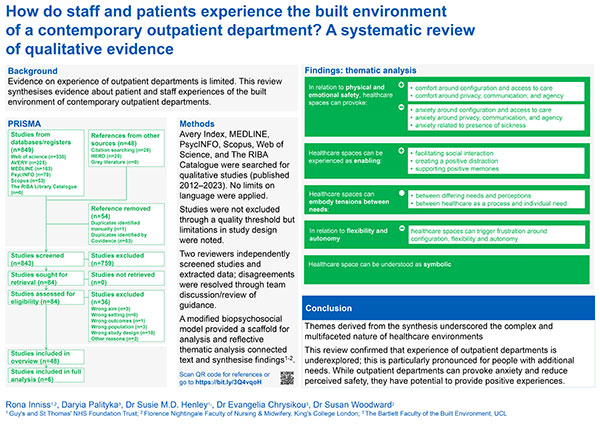How do staff and patients experience the built environment of a contemporary outpatient department? A systematic review of qualitative evidence
Rona Inniss, Daryia Palityka, Dr Susie M.D. Henley, Dr Evangelia Chrysikou, Dr Susan Woodward
Poster references
1. Engel, G. (1977) The need for a new medical model: a challenge for biomedical science. Science, 196:126-9.
2. Haynes, K. (2012) Reflexivity in qualitative research in Challenges and Controversies in Management Research. Routledge: New York
3. Glenton C, Bohren MA, Downe S, Paulsen EJ, Lewin S, on behalf of Effective Practice and Organisation of Care (EPOC). EPOC Qualitative Evidence Synthesis: Protocol and review template. Version 1.3. EPOC Resources for review authors. Oslo: Norwegian Institute of Public Health; 2022. Available at: epoc.cochrane.org/epoc-specific-resources-review-authors
Study registered with PROSPERO-CRD42023468279: https://www.crd.york.ac.uk/prospero/display_record.php?ID=CRD42023468279
EPOC’s Protocol and Review Template for Qualitative Evidence Synthesis was used in protocol preperation.3 Rona Inniss, Pre-doctoral Clinical and Practitioner Academic Fellow, NIHR302673 is funded by Health Education England (HEE)/NIHR for this project. The views expressed in this work are those of the author(s) and not necessarily those of the NIHR, KCL, NHS or the UK Department of Health and Social Care.
Poster
How do staff and patients experience the built environment of a contemporary outpatient department? A systematic review of qualitative evidence

Evidence on experience of outpatient departments is limited. This review synthesises evidence about patient and staff experiences of the built environment of contemporary outpatient departments.
Download the poster (pdf 80kb)
Background
Evidence on experience of outpatient departments is scarce. This review synthesizes evidence about patient and staff experiences of the built environment of contemporary outpatient departments.
Methods
Avery Index, MEDLINE, PsycINFO, Scopus, Web of science, and The RIBA Catalogue were searched for qualitative studies (published 2012–2023). No limits on language were applied. Primary studies on adults were included where studies used both qualitative data collection and analysis methods. Studies were not excluded through a quality threshold but limitations in study design were noted. Two reviewers independently screened studies and extracted data; disagreements were resolved through team discussion/review of guidance. A modified biopsychosocial model was applied as a scaffold for analysis and reflective thematic analysis used to connect text and synthesize findings1-2.
Findings
843 studies were screened and 48 studies included for broad overview. Of these, six papers (n=461) explicitly investigated either patient or staff experiences of outpatient departments, meeting criteria for full analysis. Language and location bias in publication/database management may have excluded studies not in English language. None of the included studies were from lower-middle or low-income countries potentially limiting generalisability of findings.
Interpretation
22 themes and 10 subthemes were explicitly described by study authors, and a further three presumed. Line-by-line coding generated 38 initial codes before key concepts, secondary themes and final interpretations were synthesised.
Themes underscored the complex and multifaceted nature of healthcare environments:
Outpatient environments provoke anxiety and frustration around physical and emotional safety. Physical safety concerns arise from presence of sickness, spatial configuration, and access to care. This is exacerbated by inherent tensions between needs and perceptions of individuals seeking care, and healthcare as a process. Emotional safety centres around privacy and dignity, communication, and autonomy.
Healthcare spaces can be experienced positively, holding symbolic meaning, facilitating social interactions, positive distractions, and fostering supportive memories.
1. Engel, G. (1977) The need for a new medical model: a challenge for biomedical science. Science, 196:126-9.
2. Haynes, K. (2012) Reflexivity in qualitative research in Challenges and Controversies in Management Research. Routledge: New York
This study is registered with PROSPERO, CRD42023468279 Available from: https://www.crd.york.ac.uk/prospero/display_record.php?ID=CRD42023468279
Rona Inniss, Pre-doctoral Clinical and Practitioner Academic Fellow, NIHR302673 is funded by Health Education England (HEE) / NIHR for this research project. The views expressed in this publication are those of the author(s) and not necessarily those of the NIHR, KCL, NHS or the UK Department of Health and Social Care.
EPOC’s Protocol and Review Template for Qualitative Evidence Synthesis19 was used to prepare the protocol.
Registration and protocol
This study is registered with PROSPERO, CRD42023468279 Available from: https://www.crd.york.ac.uk/prospero/display_record.php?ID=CRD42023468279
Support
Rona Inniss, Pre-doctoral Clinical and Practitioner Academic Fellow, NIHR302673 is funded by Health Education England (HEE) / NIHR for this research project. The views expressed in this publication are those of the author(s) and not necessarily those of the NIHR, KCL, NHS or the UK Department of Health and Social Care.
Competing interests
The authors declare that they have no competing interests.
EPOC’s Protocol and Review Template for Qualitative Evidence Synthesis19 was used to prepare the protocol: Glenton C, Bohren MA, Downe S, Paulsen EJ, Lewin S, on behalf of Effective Practice and Organisation of Care (EPOC). EPOC Qualitative Evidence Synthesis: Protocol and review template. Version 1.3. EPOC Resources for review authors. Oslo: Norwegian Institute of Public Health; 2022. Available at: http://epoc.cochrane.org/epoc-specific-resources-review-authors
The PRISMA checklist was used when writing this report: Page MJ, McKenzie JE, Bossuyt PM, Boutron I, Hoffmann TC, Mulrow CD, Shamseer L, Tetzlaff JM, Akl EA, Brennan SE, Chou R, Glanville J, Grimshaw JM, Hróbjartsson A, Lalu MM, Li T, Loder EW, Mayo-Wilson E, McDonald S, McGuinness LA, Stewart LA, Thomas J, Tricco AC, Welch VA, Whiting P, Moher D. The PRISMA 2020 statement: An updated guideline for reporting systematic reviews.
Authors
Daryia Palityka
University College London
MPhil/PhD Student, MD, AFHEA, Bartlett School of Sustainable Construction
Susie Henley
Guy’s and St Thomas’ NHS Foundation Trust
Principal/Deputy Lead Clinical Psychologist in Adult Haematology
Susan Woodward
King's College London
Senior Lecturer
Evangelia Chrysikou
University College London
Associate Professor, The Bartlett School of Sustainable Construction